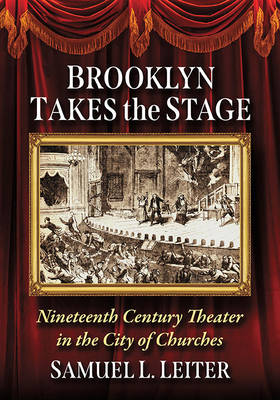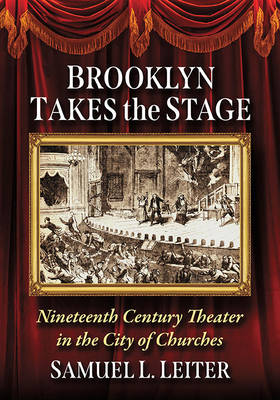
- Afhalen na 1 uur in een winkel met voorraad
- Gratis thuislevering in België vanaf € 30
- Ruim aanbod met 7 miljoen producten
- Afhalen na 1 uur in een winkel met voorraad
- Gratis thuislevering in België vanaf € 30
- Ruim aanbod met 7 miljoen producten
Brooklyn Takes the Stage
Nineteenth-Century Theater in the City of Churches
Samuel L LeiterOmschrijving
America's third largest city until 1890, Brooklyn, New York, had a striking theatrical culture before it became a borough of Greater New York in 1898. As the city gained size and influence, more and more theatres arose, with at least 15 venues ultimately vying for favor. Too many theatregoers, however, preferred the discomforts of a ferry and horsecar trip to New York's playhouses instead of supporting the local product. Nor did the completion of the Brooklyn Bridge in 1883 do Brooklyn's theatres any favors. Manhattan's Goliath slayed Brooklyn's David.
This first comprehensive study of Brooklyn's old-time theatre describes the city's early history, each of its many playhouses, its plays and actors (including nearly every foreign and domestic star), and its scandals and catastrophes, including the theatre fire that killed nearly 300. Brooklyn's ongoing struggle to establish theatres in a society dominated by anti-theatrical preachers, including Henry Ward Beecher, is detailed, as are all the ways that Brooklyn typified 19th century American theatre, from stock companies to combinations. Replete with fascinating anecdotes, this is the story of a major city from which theatre all but vanished before being reborn as a present-day artistic mecca.
Specificaties
Betrokkenen
- Auteur(s):
- Uitgeverij:
Inhoud
- Aantal bladzijden:
- 385
- Taal:
- Engels
Eigenschappen
- Productcode (EAN):
- 9781476693590
- Verschijningsdatum:
- 29/12/2023
- Uitvoering:
- Paperback
- Formaat:
- Trade paperback (VS)
- Afmetingen:
- 178 mm x 254 mm
- Gewicht:
- 671 g

Alleen bij Standaard Boekhandel
Beoordelingen
We publiceren alleen reviews die voldoen aan de voorwaarden voor reviews. Bekijk onze voorwaarden voor reviews.











